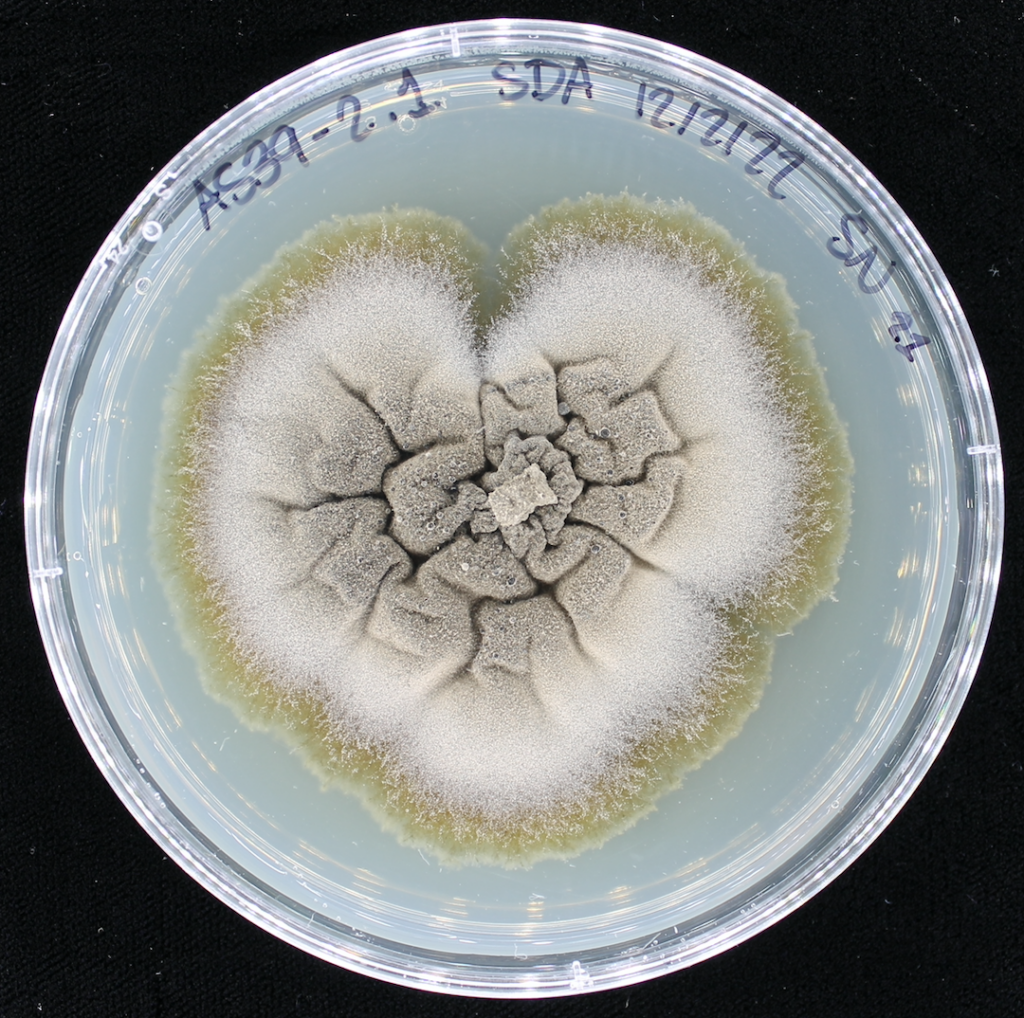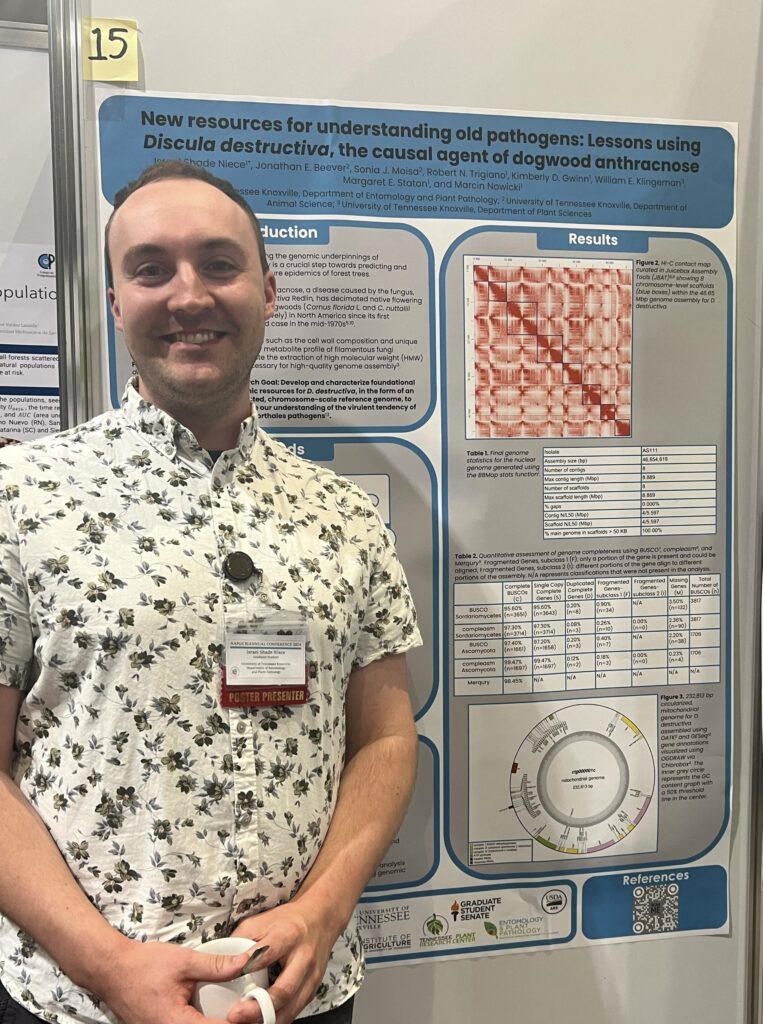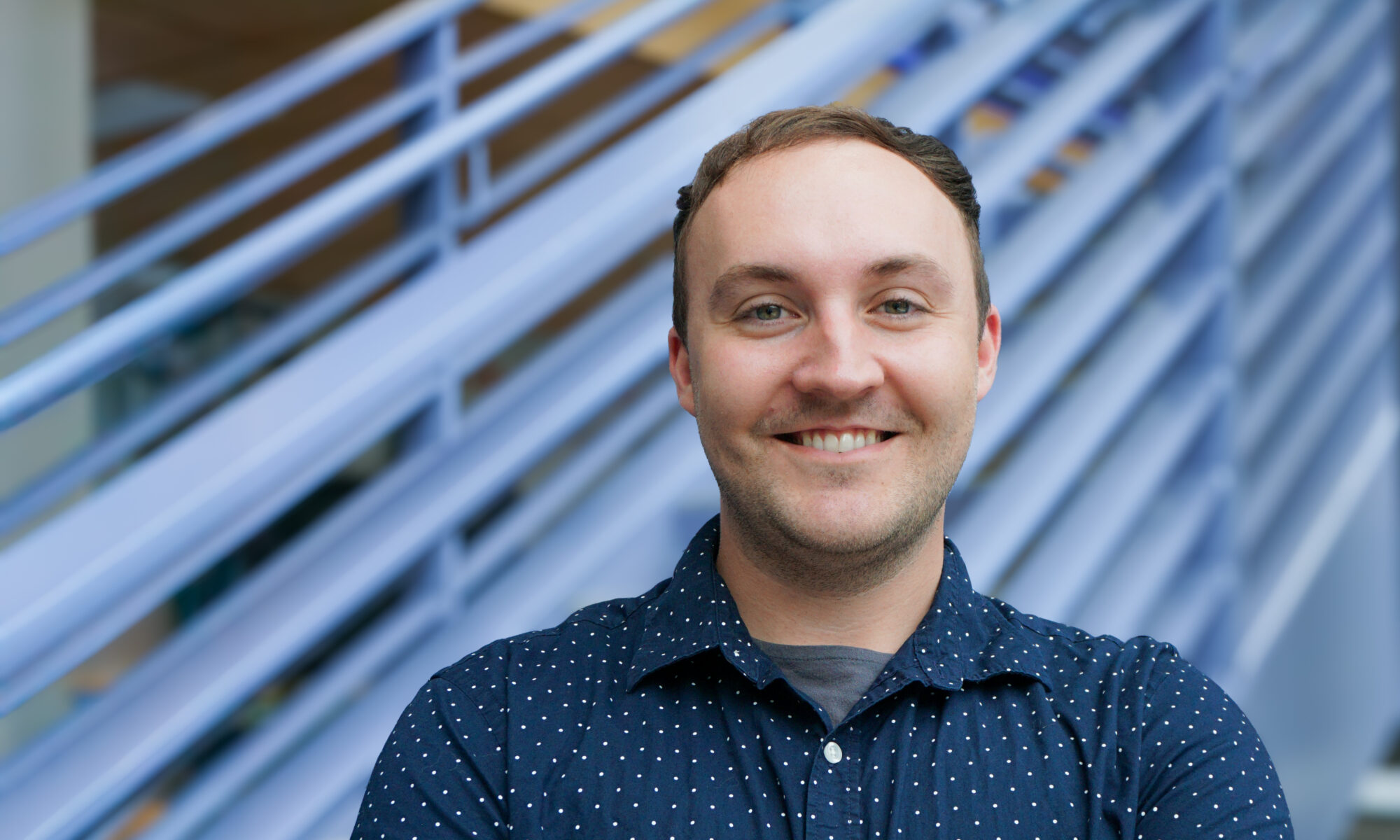
After earning a bachelor’s degree in biological sciences from the University of Tennessee, Knoxville, Shade Niece joined the Department of Entomology and Plant Pathology (EPP) as a research assistant. After gaining valuable experience in Dr. Robert Trigiano‘s lab, Niece decided to further his knowledge. Currently, Niece is pursuing a master’s degree in entomology and plant pathology with a focus in bioinformatics and genomics under the tutelage of Dr. Marcin Nowicki. As Niece prepares to graduate this August, he shares insights into his graduate research, academic journey in the Herbert College of Agriculture and future aspirations.
Q&A with Shade Niece
Can you tell me a little bit about yourself?
I was born and raised here in Knoxville, Tennessee. After graduating high school, I decided to attend the University of Tennessee, Knoxville where I obtained my Bachelor of Science in biological sciences with a concentration in biochemistry & cellular and molecular biology in 2020. I began working in Dr. Robert Trigiano’s lab in 2021 as a research assistant where I was fortunate to gain a lot of lab experience. In 2022, I decided to continue my higher education with the EPP department. I began their Master of Science program in entomology and plant pathology with a concentration in bioinformatics and genomics with Dr. Marcin Nowicki. I will graduate with my M.S. this August and plan to work in industry after graduation.
What is your concentration?
My concentration is in bioinformatics and genomics.
What is your current research question?
My current research focuses on establishing and characterizing foundational genomic resources for Discula destructiva, which is a fungal pathogen of dogwoods that causes dogwood anthracnose. My research will provide a high-quality annotated reference genome for future genomics research and will provide insight into candidate genes that increase this fungus’ pathogenicity.
Can you tell me more about your research?
I work on an ascomycete fungal pathogen called Discula destructiva, which causes dogwood anthracnose. It primarily affects our native dogwoods, Cornus florida (flowering dogwood) and Cornus nuttallii (pacific dogwood). It has caused extensive loss in North American populations of flowering and pacific dogwoods since its initial report in the mid-1970s. My specific research revolves around establishing the first genomic resources for the fungus to provide a resource for future comparative genomic studies and host-pathogen interaction studies.
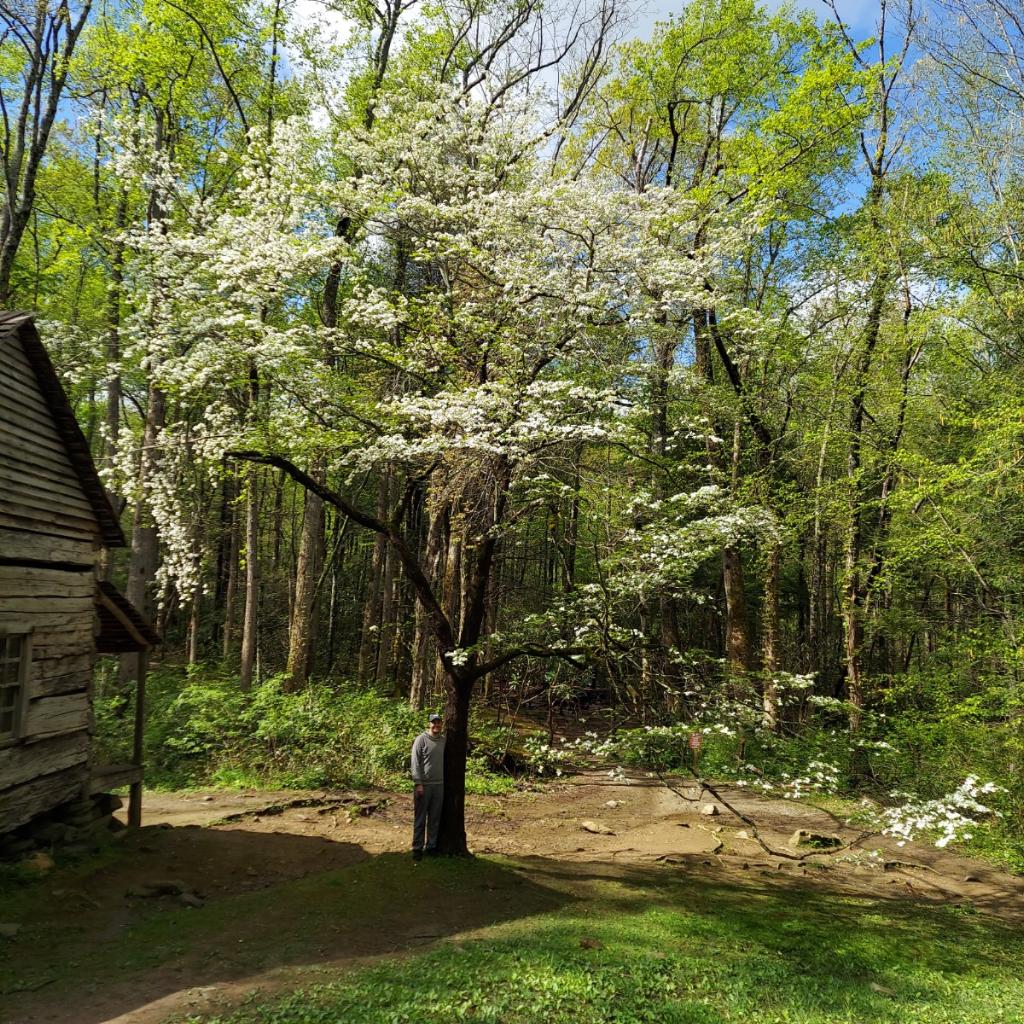
What are the primary obstacles in answering this question?
The primary obstacle I faced during my research was the generally difficult nature of fungal DNA and RNA. To develop genomic resources, I first needed to extract high-quality RNA and high molecular weight DNA for third-generation sequencing. Getting the high-quality RNA and HMW DNA proved to be more extensive than anybody anticipated. Overall, it took ~1 year from trialing many extraction methods to receiving my data, so this was definitely the biggest hurdle I’ve faced.
What academic class has been your favorite and why?
My favorite classes that I’ve taken as a graduate student have been EPP 505: Mycology and EPP 622: Bioinformatics Applications. Besides being interesting and fun to take, both classes helped me tremendously with my current research in fungal genomics.
How has your academic training at The University of Tennessee prepared you for a career?
I’ve learned how much networking and collaboration matter throughout graduate school. From my research project to participating in university social events, I’ve been able to see the connections people build that allow them to collaborate and how different fields intersect. Attending and presenting at conferences throughout graduate school has been not only fun but also a great learning experience in becoming a well-rounded professional.
What has been the highlight of your graduate school experience so far?
I’ve had lots of highlights throughout graduate school, but I think my favorite highlight has been the friends that I’ve made. Graduate school is not easy, to say the least, and having friends with shared experiences who you can spend time with outside of academics has been one of the best things.
What do you believe is your biggest academic achievement?
My biggest academic achievement has been maintaining my 4.0 GPA and completing my research project. I’ve had a less-than-conventional path toward graduate school, so being able to accomplish those two things has been a massive personal accomplishment that has helped with my self-confidence and ability to persevere.
What extracurricular activities do you participate in?
Outside of classes and research, I like to attend as many EPP GSA meetings as possible and help take care of our plants in the nursery complex, or as we like to call it, Graceland.
What are your favorite hobbies?
I’m a plant nerd at heart, so I love spending time in my garden and greenhouse taking care of my native plants, orchids, and cacti. I also love spending time in the Smoky Mountains doing just about anything- hiking, plant scouting, or just driving.
What are your favorite things to do on campus?
My favorite things to do on campus are going to Capybara Coffee, walking through UT Gardens, and catching up with friends.
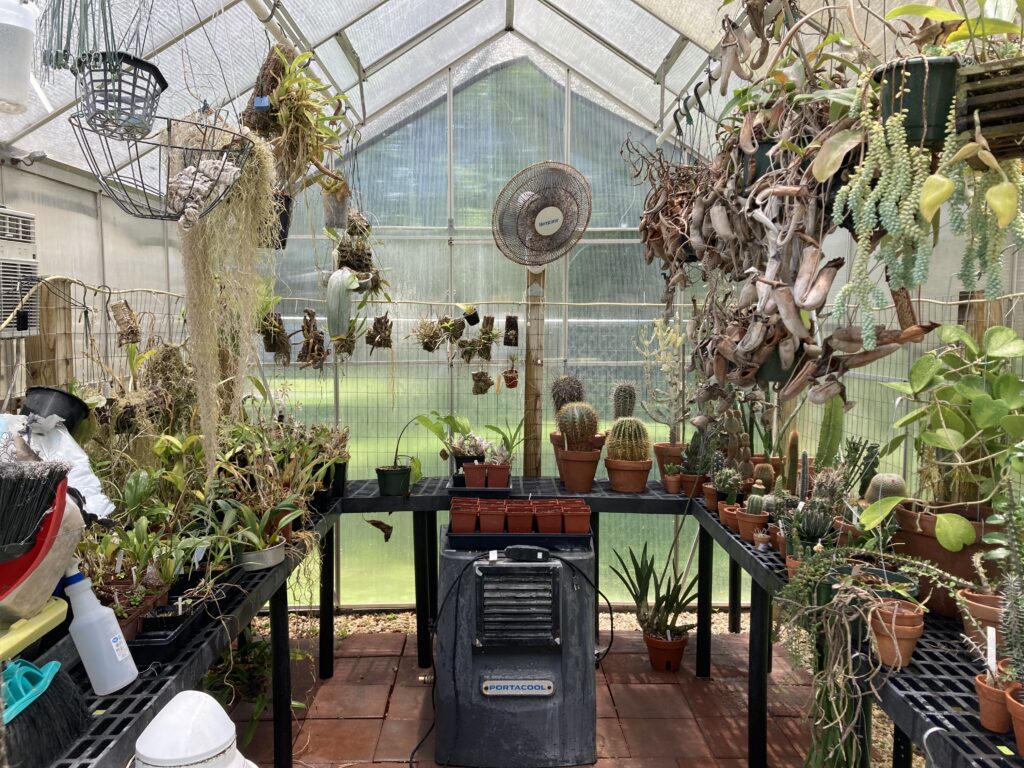
Any advice you would like to share with a prospective student?
I would preface it by saying that graduate school is going to test your limits and push you out of your comfort zone. I think it’s good to go into graduate school knowing that you’re going to change as a person, but that’s ultimately going to benefit how you approach new situations and problems. It’s also important to remember that there are people here in the department who want to see you succeed, so don’t be scared to reach out for help regardless of the situation.
Is there anything that you would like to add?
I just want to thank EPP for allowing me to learn and develop my skills here. It has been a pleasure getting to know so many people in our department who have also been encouraging throughout this whole process. I can’t express enough how grateful I am to have had this experience, so thank you again to everyone in the EPP department.
